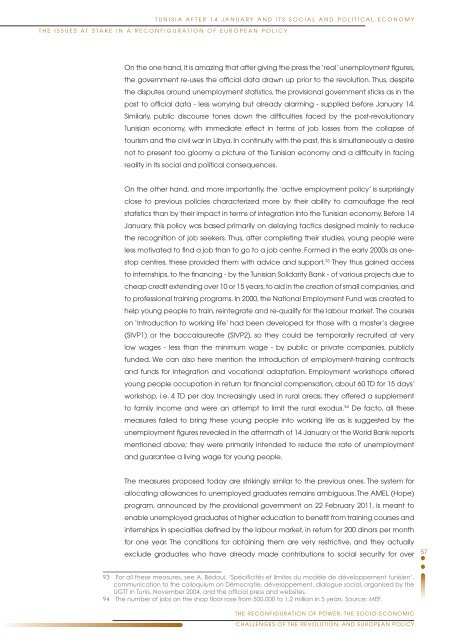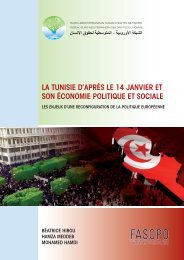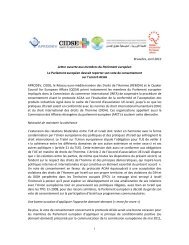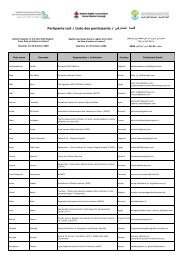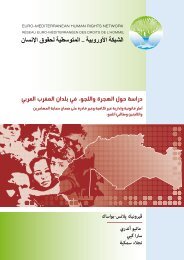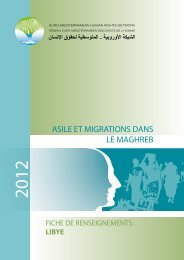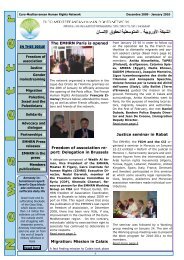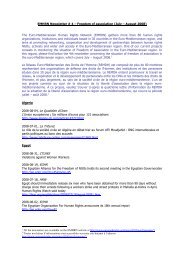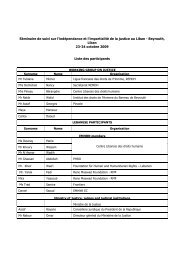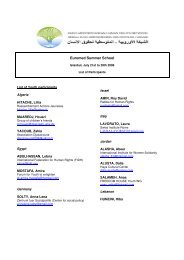tunisia after 14 january and its social and political economy - Refworld
tunisia after 14 january and its social and political economy - Refworld
tunisia after 14 january and its social and political economy - Refworld
You also want an ePaper? Increase the reach of your titles
YUMPU automatically turns print PDFs into web optimized ePapers that Google loves.
T U N I S I A A F T E R 1 4 J A N U A R Y A N D I T S S O C I A L A N D P O L I T I C A L E C O N O M YT H E I S S U E S A T S T A K E I N A R E C O N F I G U R A T I O N O F E U R O P E A N P O L I C YOn the one h<strong>and</strong>, it is amazing that <strong>after</strong> giving the press the ‘real’ unemployment figures,the government re-uses the official data drawn up prior to the revolution. Thus, despitethe disputes around unemployment statistics, the provisional government sticks as in thepast to official data - less worrying but already alarming - supplied before January <strong>14</strong>.Similarly, public discourse tones down the difficulties faced by the post-revolutionaryTunisian <strong>economy</strong>, with immediate effect in terms of job losses from the collapse oftourism <strong>and</strong> the civil war in Libya. In continuity with the past, this is simultaneously a desirenot to present too gloomy a picture of the Tunisian <strong>economy</strong> <strong>and</strong> a difficulty in facingreality in <strong>its</strong> <strong>social</strong> <strong>and</strong> <strong>political</strong> consequences.On the other h<strong>and</strong>, <strong>and</strong> more importantly, the ‘active employment policy’ is surprisinglyclose to previous policies characterized more by their ability to camouflage the realstatistics than by their impact in terms of integration into the Tunisian <strong>economy</strong>. Before <strong>14</strong>January, this policy was based primarily on delaying tactics designed mainly to reducethe recognition of job seekers. Thus, <strong>after</strong> completing their studies, young people wereless motivated to find a job than to go to a job centre. Formed in the early 2000s as onestopcentres, these provided them with advice <strong>and</strong> support. 93 They thus gained accessto internships, to the financing - by the Tunisian Solidarity Bank - of various projects due tocheap credit extending over 10 or 15 years, to aid in the creation of small companies, <strong>and</strong>to professional training programs. In 2000, the National Employment Fund was created tohelp young people to train, reintegrate <strong>and</strong> re-qualify for the labour market. The courseson ‘Introduction to working life’ had been developed for those with a master’s degree(SIVP1) or the baccalaureate (SIVP2), so they could be temporarily recruited at verylow wages - less than the minimum wage - by public or private companies, publiclyfunded. We can also here mention the introduction of employment-training contracts<strong>and</strong> funds for integration <strong>and</strong> vocational adaptation. Employment workshops offeredyoung people occupation in return for financial compensation, about 60 TD for 15 days’workshop, i.e. 4 TD per day. Increasingly used in rural areas, they offered a supplementto family income <strong>and</strong> were an attempt to limit the rural exodus. 94 De facto, all thesemeasures failed to bring these young people into working life as is suggested by theunemployment figures revealed in the <strong>after</strong>math of <strong>14</strong> January or the World Bank reportsmentioned above; they were primarily intended to reduce the rate of unemployment<strong>and</strong> guarantee a living wage for young people.The measures proposed today are strikingly similar to the previous ones. The system forallocating allowances to unemployed graduates remains ambiguous. The AMEL (Hope)program, announced by the provisional government on 22 February 2011, is meant toenable unemployed graduates of higher education to benefit from training courses <strong>and</strong>internships in specialties defined by the labour market, in return for 200 dinars per monthfor one year. The conditions for obtaining them are very restrictive, <strong>and</strong> they actuallyexclude graduates who have already made contributions to <strong>social</strong> security for over5793 For all these measures, see A. Bédoui, ‘Spécificités et limites du modèle de développement tunisien’,communication to the colloquium on Démocratie, développement, dialogue <strong>social</strong>, organised by theUGTT in Tunis, November 2004, <strong>and</strong> the official press <strong>and</strong> websites.94 The number of jobs on the shop floor rose from 500,000 to 1.2 million in 5 years. Source: MEF.The reconfiguration of power, the socio-economicchallenges of the revolution, <strong>and</strong> European policy


